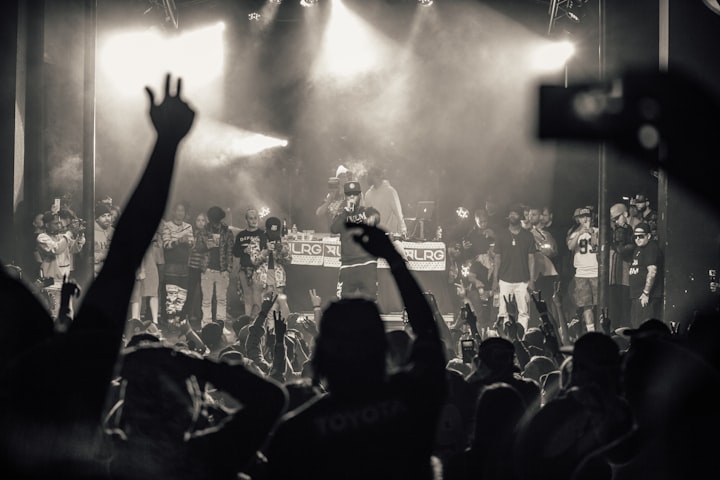
The woman who would one day be coined the “Ruff Ryders’ First Lady” grew up in the housing projects of Philadelphia. Eve Jeffers—or, more simply, Eve—began her career as a teenager, singing in a band called D.G.P, or the Dope Girl Posse.
The feminist name should strike a particular chord, as Eve went on to become an icon for female artists everywhere. Branching out on her own, Eve rapped under the pseudonym “Eve the Destruction” before deciding to stick to her first name, dropping the rest. It was apparently a wise decision, as not long after she caught the attention of powerhouse producer, Dr. Dre. Though her contract with Aftermath never resulted in much, it did lead to her being picked up by the Ruff Ryders a couple years later.
Eve first featured on the group’s 1999 album, Ryde or Die, before releasing her own solo album the same year. The album, which was titled, Let There Be Eve: Ruff Ryders’ First Lady, was the musical equivalent of Eve kicking down the door and letting the world know she’d arrived. Featuring huge names such as DMX, Faith Evans and Missy Elliott, the album went double platinum, selling over 2 million copies. It also snagged the number one slot in the US, making Eve the third female rapper to have the honours, joining the likes of Foxy Brown and Lauryn Hill.
Not too shabby, especially when you consider she was only twenty-one at the time.
I was twelve when her first album came out, and I still remember the first time I heard the song "Love is Blind". At that age I was unable to fully comprehend the significance behind it, but I knew it held power. With Faith Evans singing the main hook, Eve raps about the cold, hard truth of domestic violence; something she learned firsthand through the struggles of her best friend.
Though in real life her best friend managed to escape alive, "Love is Blind" can serve as a cautionary tale to the many African American women who suffer at the hands of domestic abuse. A study conducted a few years ago by the Institute for Women’s Policy Research (IWPR), found that 92% of murdered Black women knew their killer. Of those women, 56% were killed by either a former or current partner.
Though other Black female artists have spoken openly about their own experiences with domestic violence, most of them have failed to put their experience where their mouth is. In an industry where many songs and videos are seen to perpetuate the abuse and sexism of women, it is Eve’s voice alone which stands out.
Not only did she refuse to sexualize herself for fame (unlike most of the other female artists we all know and love), Eve went on record with her intent to make music that would honour women, encouraging them to own the same self-respect she held for herself. During a time when female artists were a minority, Eve remained true to her standards. Instead of giving in to label pressure to take off her clothes, she found acceptance when she joined with the Ruff Ryders, who told her, “we like who you are, we’re not going to try and change you.”
Eve’s next album, Scorpion, contained the grammy-winning duet “Let me Blow Ya Mind,” featuring Gwen Stefani. The same song also won the MTV Music Video award for Best Video, in which Eve and Gwen terrorize a bunch of rich people at what looks like a hideously boring party. They manage to liven things up, and eventually people from two different worlds come together to let loose and have a good time. The conveyed message is one of equality and togetherness, which throughout the years has been a constant theme in both Eve's music and her personal life. (Scorpion was also grammy nominated for the Best Rap Album, but lost to Outkast’s Stankonia.)
I grew up listening to rap—much to the chagrin of my parents—and am proud to say I can rap every lyric to more than a few songs by NWA. The nineties were essentially the Klondike Gold Rush of hip-hop talent, unearthing the likes of Notorious B.I.G., Eminem, and Tupac, to name a few. The nineties weren't short of legendary women either, introducing us to Lil’ Kim, Foxy Brown, and the amazing Missy Elliott. Yet, out of all the rappers who have come and gone, I still hold a special place in my heart for the Ruff Ryders’ First Lady.
Rap has a bad reputation, sure, but a lot of that comes from the stereotyping of an entire genre of music. Make your way past the gang-glorifying, explicit content and derogatory lyrics, and you will find art in its purest form—raw passion. A lot of hip-hop artists grew up knowing a type of struggle I can’t even begin to imagine.
We see it depicted in Eminem’s semi-autobiographical film 8 Mile, and we can hear it in Eve’s “Heaven Only Knows” where she raps about her experience of working as a stripper. For many rap artists, music was the only lifeline out of a life where everyone was telling them they were destined to fail. The only way to express emotions they were being told they weren’t supposed to feel.
Dig down beneath the grit and you will find artists like Eve, who use their music to send a message.
I’m a white woman and I believe Black Lives Matter. In spite of the fact Eve’s debut album was introduced more than twenty years ago, her message of togetherness and empowerment has never been so relevant as it is now. George Floyd and Breonna Taylor are only two of the tragic victims whose deaths have aimed a spotlight at issues such as police brutality and white privilege.

Eve was recently criticized for an interview she gave discussing the death of George Floyd. Eve married Maximillion Cooper—a white man—in 2014, and during the interview she discussed how, in the aftermath of Floyd’s death, she and Cooper had been having some “uncomfortable” conversations. Critics took issue with this, maintaining Eve should have had those conversations before she was married.
In true, boss-lady fashion, Eve shot back. She went public with her own experiences with racism, and how being in an interracial relationship has opened the eyes of her husband up to how it feels to be singled out as a minority.
Many Black Americans, particularly women, have suffered at the hands of disparity. Now is the time to embolden these women, and lift them up to where they deserve to be. By remaining true to her core values Eve has shown women everywhere that they don’t have to bow down to the pressures of life. That they can—and should—be accepted for who they are, and not what everyone else expects them to be.






Comments
There are no comments for this story
Be the first to respond and start the conversation.